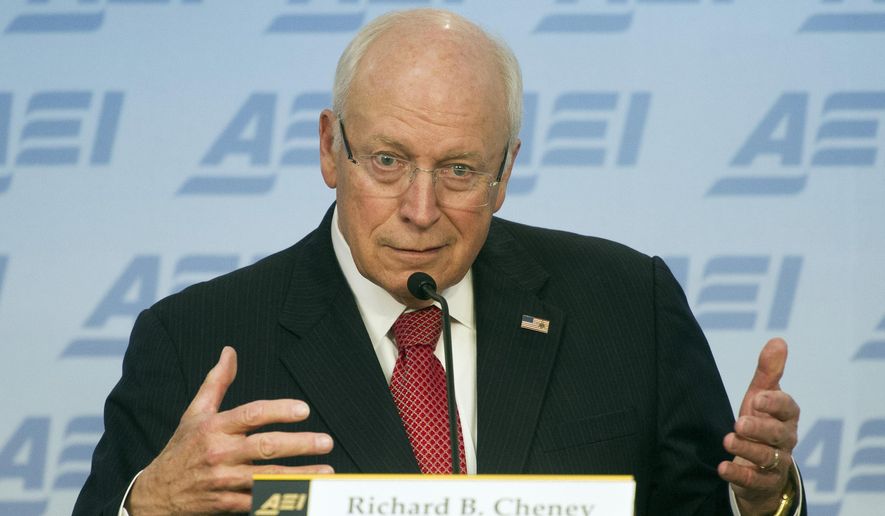Former Vice President Dick Cheney’s re-emergence in Washington this week to talk about fighting terrorists in Iraq must have seemed like a bad nightmare for President Obama, who is trying to make a case to skittish voters that the U.S. can expand its military action in the Middle East without repeating the mistakes of his predecessor’s war on terror.
For Mr. Obama and his allies on Capitol Hill, the specter of Mr. Cheney and his boss, President George W. Bush, continues to hang over them as they try to grapple with the ascendent insurgents of the Islamic State, also known by the acronyms ISIS and ISIL.
“This effort will be different from the wars in Iraq and Afghanistan. It will not involve American combat troops fighting on foreign soil,” Mr. Obama vowed — a point the White House was so intent on making that it gave reporters a sneak peak at that specific quote hours ahead of the president’s speech.
Senate Majority Leader Harry Reid went further, delivering a stinging rebuke of Mr. Cheney on the Senate floor, and seeking to reinforce the point that Mr. Obama won’t fall into the same traps.
“Dick Cheney is more responsible than anyone else for the worst foreign policy decision in the history of the country: the invasion of Iraq,” said Mr. Reid. The Nevada Democrat had voted for the 2002 resolution authorizing the war in Iraq, but has said it was a mistake in hindsight and challenged colleagues Wednesday to “do it the right way this time.”
Where Mr. Bush and Mr. Cheney committed tens of thousands of ground troops to oust Saddam Hussein, then had to keep them in place for years to hold the country together afterward, Mr. Obama said he wants to empower Iraqis to lead the fight themselves.
The same is true in Syria, where he wants to arm moderate rebels and hope they can stem the ascendance of the Islamic State.
For a president who won office on promises of ending wars and on not being Mr. Bush, it’s a tricky sell, and former Bush administration officials have watched with bemusement.
“Once again President Obama’s campaign rhetoric has smacked into reality. Foreign policy is more complicated than simply being against whatever George Bush was for,” said Matthew Latimer, a former speechwriter for Mr. Bush who now runs Javelin, a communications firm. “Ironically, the president’s efforts to be ’anybody but Bush’ may well have led the administration to create a situation in the Middle East that requires a Bush-like solution.”
The irony is the public may be warming to a Bush-like solution.
The latest polling shows the public strongly in support of expanded airstrikes, and a Fox News poll released Wednesday evening even found 50 percent of American voters believe U.S. ground troops will be needed if the Islamic State is to be destroyed.
Overall, voters don’t have much confidence in how Mr. Obama has handled the emerging threat, which earlier this year he termed the “JV” squad of terrorists. And the likely voters surveyed are now just as likely to believe that his 2011 withdrawal of combat troops was a mistake as they are to say it was the right move.
PHOTOS: See Obama's biggest White House fails
Michael O’Hanlon, a senior fellow at the Brookings Institution, said Mr. Obama’s 2011 push to pull out combat troops was partly driven by his desire to separate himself from Mr. Bush.
“By contrast, I think by now President Obama is focused on a clear and present threat. He’s past his elections, just like President Bush is,” Mr. O’Hanlon said. “Of course, politics never goes away, and the Obama legacy will be fair game in the midterms and the 2016 presidential race. But I think that, at this point at least, the range of options Mr. Obama will consider says more about his worldview than about his fixation on his predecessor.”
Even if Mr. Obama is no longer fixated on Mr. Bush, Mr. Cheney is still fixated on the president.
Mr. Cheney briefed congressional Republicans about the threats from an ascendant Islamic State on Tuesday, and on Wednesday he gave a speech at the American Enterprise Institute — arranged well before Mr. Obama’s address to the nation was scheduled — in which he blasted the president for squandering the Bush administration’s work.
“This is the same president, after all, who not long ago was assuring the nation that the tide of war was receding,” he said. “That was the very time when the dangers now obvious to all were gathering.”
He questioned Mr. Obama’s approach to foreign crises, which he said often amounts to “announcing all the things he will not do” rather than laying out a muscular vision for exerting American leadership.
“If you think an American withdrawal marks an ebbing of conflict and a return to peace, then consider the new Islamist caliphate and all that will be needed to clean it up,” he said.
• Stephen Dinan can be reached at sdinan@washingtontimes.com.




Please read our comment policy before commenting.